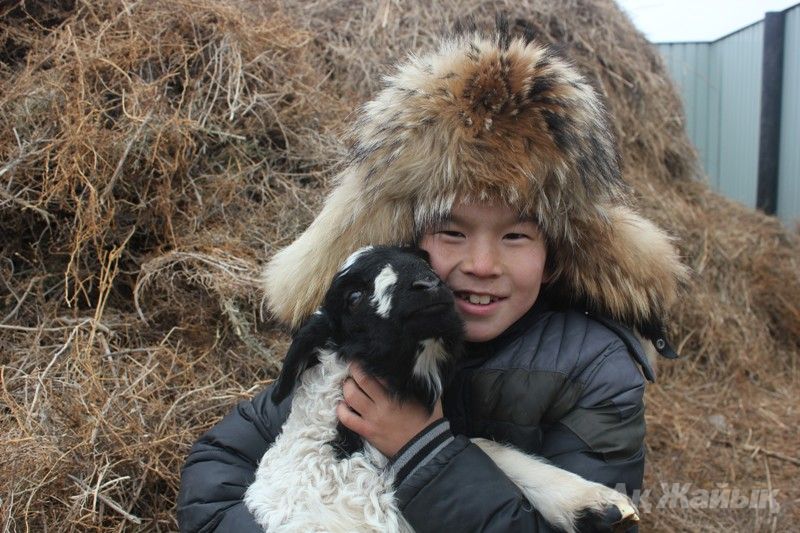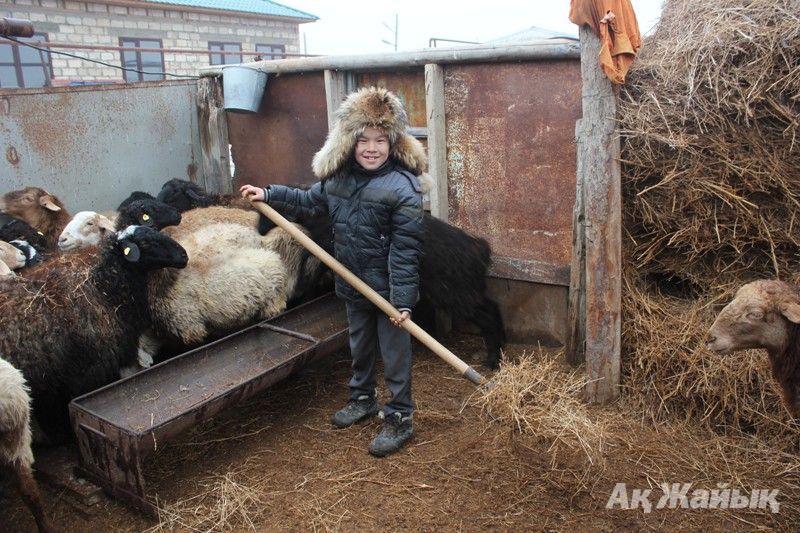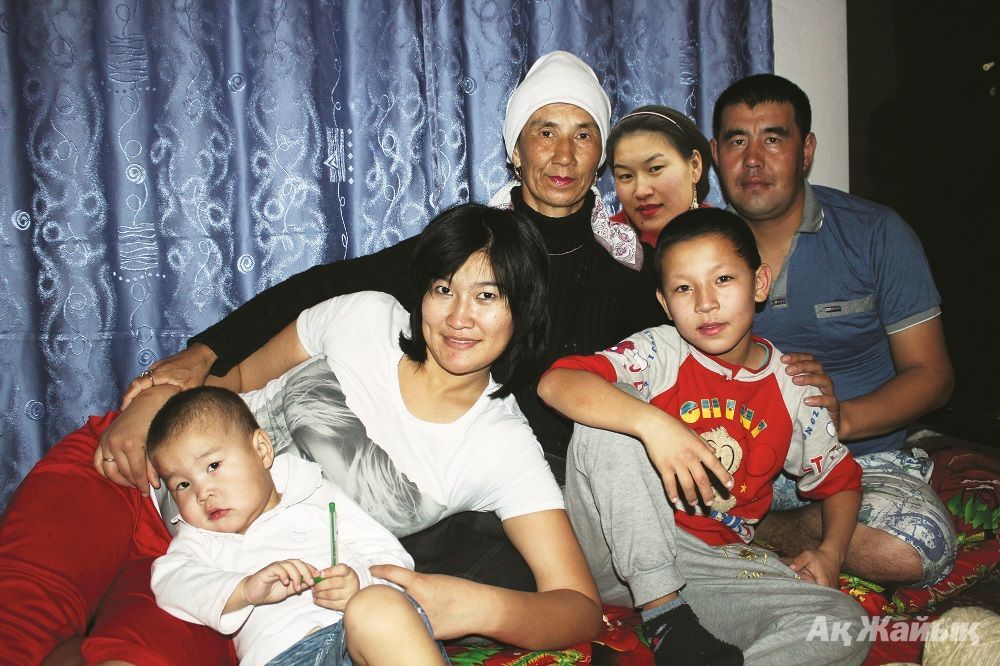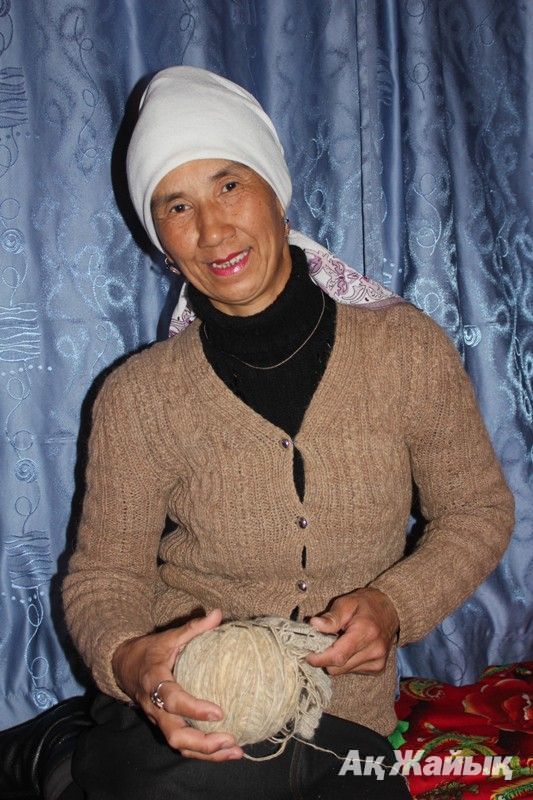 Igilik with new born lamb“One more aul (Kazakh village) disappeared from the face of the earth. Abandoned human settlements are pitiful sights”, – I thought when I arrived to the small settlement called Obaly, where once lived my old acquaintance Bibigul with her big, close-knit family. She had four daughters and two sons and I brought to them New Year gifts in the form of food items and other handy stuff that I purchased with the money collected by my colleague journalists from AkZhaik newspaper.
Igilik with new born lamb“One more aul (Kazakh village) disappeared from the face of the earth. Abandoned human settlements are pitiful sights”, – I thought when I arrived to the small settlement called Obaly, where once lived my old acquaintance Bibigul with her big, close-knit family. She had four daughters and two sons and I brought to them New Year gifts in the form of food items and other handy stuff that I purchased with the money collected by my colleague journalists from AkZhaik newspaper.
Abandoned Aul
On a lop-sided door of a shabby tokaltam, an adobe lodge with a flat roof, there was a big padlock. In the aul, where once used to live a few families, there was not a soul.
 Little Igilik looks after the cattle.At that moment it seemed to me that I am standing there and saying goodbye to the last ‘island’ of traditional, centuries-old tenor of life of the Kazakhs. Taking a view of the steppe and pumping into lungs the air filled with smell of dry grass, manure and a damp adobe bricks, I got into my car and started the engine. Suddenly a white kitten ran out from the shed and rushed to my car. The hope flashed in my heart that the aul, after all, hasn’t been abandoned, and people still lived there! The kitten at that moment was like a sign that people left the aul just for a while.
Little Igilik looks after the cattle.At that moment it seemed to me that I am standing there and saying goodbye to the last ‘island’ of traditional, centuries-old tenor of life of the Kazakhs. Taking a view of the steppe and pumping into lungs the air filled with smell of dry grass, manure and a damp adobe bricks, I got into my car and started the engine. Suddenly a white kitten ran out from the shed and rushed to my car. The hope flashed in my heart that the aul, after all, hasn’t been abandoned, and people still lived there! The kitten at that moment was like a sign that people left the aul just for a while.
A little inspired, I stopped by at the nearest roadside “Alaman” cafe and asked the shop assistant if she knew whereabouts of Bibigul from Obaly aul. My question was, probably, heard, by one of visitors of cafe who told me that Bibigul moved to district centre of Akkistau, but he didn’t know her address. Relying on a bit of luck I went to Akkistau. I was very lucky, indeed, - the first passerby showed me the house where lived Bibigul, Saifolla's daughter from Esengul Berish clan.
 Bibigul among her family – her daughters Perizat and Anar, her son Rakhat, grandson Madi and son-in-law Amanzhol.The door opened Bibigul. With the words “Oh, dear, my sunshine and moonshine, ainalain”, she gave me a hug. Her face expressed surprise and happiness at the same time. It appeared that she drove the last batch of cattle that she looked after during summer season on dzhailau (summer pasture) for the winter period to Akkistau. When her husband died, she had six small children and earned her living by grazing cattle that belonged to Akkistau's inhabitants in the steppe near Obaly village. And during winter time she moved to Akkistau, to the barrack-type lodge, with her younger children…
Bibigul among her family – her daughters Perizat and Anar, her son Rakhat, grandson Madi and son-in-law Amanzhol.The door opened Bibigul. With the words “Oh, dear, my sunshine and moonshine, ainalain”, she gave me a hug. Her face expressed surprise and happiness at the same time. It appeared that she drove the last batch of cattle that she looked after during summer season on dzhailau (summer pasture) for the winter period to Akkistau. When her husband died, she had six small children and earned her living by grazing cattle that belonged to Akkistau's inhabitants in the steppe near Obaly village. And during winter time she moved to Akkistau, to the barrack-type lodge, with her younger children…
Smell of Tabanan Bread
I got acquainted with Bibigul a few years ago. I read about her in the newspaper. The article was titled “In Winter We Drink Melted Snow”. I decided to visit Bibigul’s family and, maybe, somehow help her. I then also purchased some food and took some money with me and left into the unknown, to the place in the steppe called Obaly aul, located 10 km away from Akkistau.
It wasn’t difficult to find her house, or to be more precise, a rather pathetic hovel where Bibigul lived with the big family of seven people, - in the steppe people know each other rather well, even if they are separated by tens of kilometers.
When I entered the lodge, Bibugul’s family were sitting at the table, they had tea. The only food that I saw on the table was freshly baked tabanan -a round loaf baked in charcoal and a teapot. Nothing else …
I explained the purpose of my unexpected visit, unloaded food items, gave her the money and rushed to drive back home to town.
 Bibigul learned to work with wool from mer mother Sabilya.At that moment the hostess of the house Bibigul cut the half of a loaf and stretched it to me. I felt uneasy, because I saw that they, except bread, had nothing on the table. But Bibigul managed to put half of a loaf into my hands. Outside, waking towards my car, I closed my eyes and smelled the bread. To me that piece of tabanan bread had a special value...
Bibigul learned to work with wool from mer mother Sabilya.At that moment the hostess of the house Bibigul cut the half of a loaf and stretched it to me. I felt uneasy, because I saw that they, except bread, had nothing on the table. But Bibigul managed to put half of a loaf into my hands. Outside, waking towards my car, I closed my eyes and smelled the bread. To me that piece of tabanan bread had a special value...
I didn't drove too far - suddenly the pouring summer rain showered cats and dogs. It became clear that I on my old Zhiguli car, for certain, will get stuck in the steppe. So I had to stay overnight in Obaly. And that’s how I got acquainted with this surprising family that lived in the steppe.
Magic lamp of poetry
... In the evening we had meat a la Kazakh - beshbarmak and tea by the light of an oil lamp. I decided to sing them a few songs in foreign languages. After my several performances, that they enthusiastically apprehended, Bibigul somehow timidly said her girls also like singing and even compose poems and she also writes her own verses.
She started reciting... Then her children started to recite their verses …
I sat there and didn’t’ move. I was afraid to frighten away the miracle that was unfolding in font of my eyes. It was such a remarkable poetry evening! Little poetesses of steppe wrote their verses by the light of an oil lamp. Bibigul’s daughters recited delightful stanzas and showed me thick notepads completely filled with verses.
Many times in my life I encountered miracles - a roaring Niagara Falls, I climbed Mount Cook and peak of Chekhov, I swam with big turtles in Hawaii and flew high in the sky on a glider... But nothing out of that could be compared to the state which I experienced at that moment when the members of this is family, that lived in absolute poverty in the wilderness, read their verses written by the light of an oil lamp. After all, the soaring of the soul is somthing much higher than soaring on a glider.
And my attempts in the form of singing songs in foreign languages seemed like cheap coins compared to the diamonds of scattered poetic lines of these children, compared to the sound of the native speech. My knowledge of foreign languages, I must admit, here wasn't even absolutely pertinent. Here reigned other values, other common concepts, other language. Here were other idols – Mukagali, Fariza, Mukhtar…
Meeting Venus- Tan Sholpan
One more surprise waited for me when we went to sleep outside, on a trestle bed, under the stellar sky. Children ‘organized’ for me an excursion on the stellar sky. Interrupting each other, they started to acquaint me with the stars.
– Look, over there, there are two stars - the heavenly horses (Akboz ат– the White horse and Kokboz ат– the White-blue horse) attached by a gold chain to the Iron stake – Temir Kazayk (the Polar star). Can you see in the sky the traces of a gold chain? ... Seven robbers (Zhety karakshy -the Big Dipper) want to steal the horses. They don't sleep all night long and do a full revolution round the Pole star and the horses, but as soon as the robbers come near the horses, the Morning Star -Tan Sholpan (the Venus) appears in the sky at 5 or 6 o'clock in the morning. There comes the morning and seven robbers hide.
And that is Urker (the Pleiades) - animals want to catch it to have an eternal summer.
And that is Kus Zholy – the Birds’ Path (Milky Way), it moves round all night long like the hands on the watch dial.
Listening to their stories about the stellar sky, you start understanding why the researchers of the Kazakh steppe wrote that nomads look at the sky as the European looks at his pocket watch.
Promising to wake us up at 5 o'clock in the morning to meet Venus, Bibigul wished us good night. Early in the morning stars in the pale sky disappeared, and there was the only bright star- Tan Sholpan.
And then Bibigul showed me how to weave a carpet. She keeps her mother Sabilya’s all weaving tools and even continues her mother’s passion.
Later I organized a special exhibition of hand-made items that Bibigul and her children made, and she showed us a master class in weaving.
Igilik's dreams
Dreams of a village boy are different, they are not spoiled by iPhones and iPads. The eldest son, 10-year-old Rakhat, was visiting his sister who lives in the city, the youngest son Igilik was at home. He is 9. Igilik has always a smile on his face. His friends and relatives nicknamed him Mukhtar Shakhanov, not only for his external similarity to the famous poet, but also for the courage of his character, resourcefulness and a sharp tongue, he is never at a loss for a word.
We are sitting in a small room and Igilik shows me the drawings of the future of his village and explains that life will soon change for the better there. "Mother will own two vehicles – a Kamaz truck for transportation of hay and Gazelle van – for transportation of cattle. We will have a bigger house, and each one of us will have a separate room. Here we will build a paved road, and over there a bath house – separate for women and men and separate toilets. We will have a horse in our yard and for my birthday my mother will give me a baby camel as a present".
Then he tells me how he looked after the cattle in the summer and that he knows what is necessary to do to make sheep corpulent. And then he starts giving me the lessons of life by recollecting the Kazakh proverbs: "If you have a problem with your stomach, you need to control your mouth and if you have problems with your eyes you need to contorl your hands", "A hungry boy doesn't play with a well-fed boy, and well-fed boy never thinks that he can be hungry". I wonder, if Igilik had all these iPhones and iPads, would he still have the desire to dream, read and draw?
She dreams about Obaly
In this December trip – now to Akkistau, and not to Obaly village - I learned that Bibigul’s three eldest daughters got married, and that she has grandchildren now. Younger sons went to school.
The local akimat (government) helped her with housing at the regional center. Although it is a barrack-type lodge, but it has electricity and heating.
However, Bibigul didn't leave her old house in Obaly.
– My real house is there, – she tells me. – It is difficult for me to part with Obaly. In the summer I graze people’s cattle, that’s how I earn my daily bread, but it is difficult for children to go to school every day covering tens of kilometers. Here, in the district centre, it is convenient, of course. The school is nearby, we have power and heating, but the soul cries out for the steppe. I can't get used to this life.
Here we lock the door even when we go to fetch water, and we ask “who is there?” every time someone knocks on our door... In Obaly, if someone knocks on the door (by the way, it is never locked), we open it with pleasure and happy to see the guests, but here we became a bit careful.
Putting a humble food on the table, she continues:
– Over there, in the open country, you breath more freely, and here there is so much garbage. When my mother was alive, she used to teach us not to step on the places where slops or simply dirty water is poured; such places were considered dirty and bringing diseases.
Bibigul always mentions the names of her mother Sabilya and her father Saifolla. She teaches her children on the example of her parents. “My Mother taught me so... My father used to say...” – teaches her children Bibigul.
Brought up in a warm atmosphere of maternal love, her children don't feel inferior that they have no mobile phone, iPad or expensive clothes. Surprisingly, but in this poorest family nobody complains of shortage of the most necessary things. Even little Igilik treats life philosophically. "Once I will save up a lot of money and I will buy laptop", – says he pensively, but a minute later he happily gives all his saved-up money to mother to buy milk or butter.
Bibiugul calls her children only by pet names. On behalf of my colleagues I wish this family a Happy New Year. The eldest daughter Tatti is called Zhourek (Heart), the second daughter Aimendy is called Aim (My moon), Perizat – Kounim (My sun), Anar –Goulim (My flower), Rakhat – Zhanym (My soul), and Igilik is called Zhan (one more Soul).
By Zeena Urynbassarova
Photos taken by the author
 В Атырау
+25
В Атырау
+25  Send your news to AqZhaiyq
Send your news to AqZhaiyq